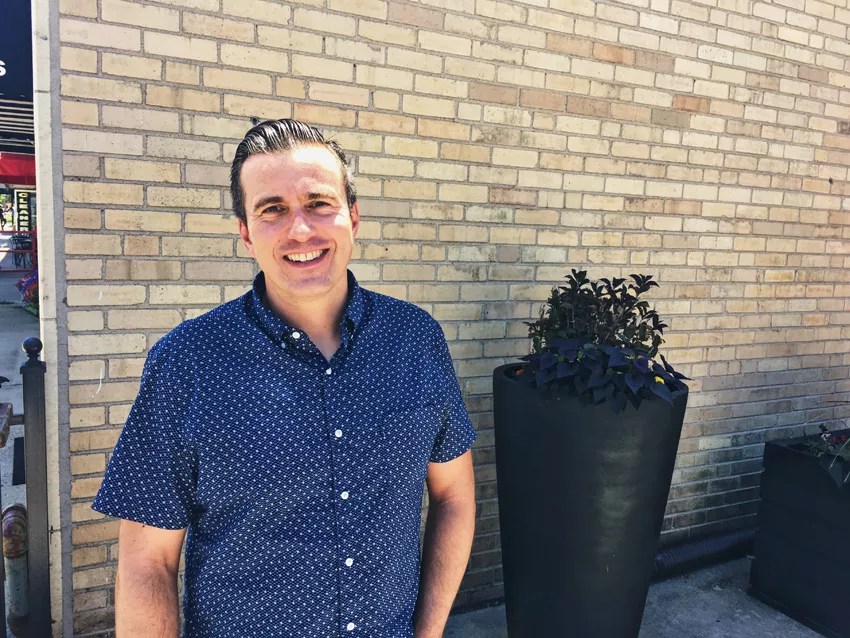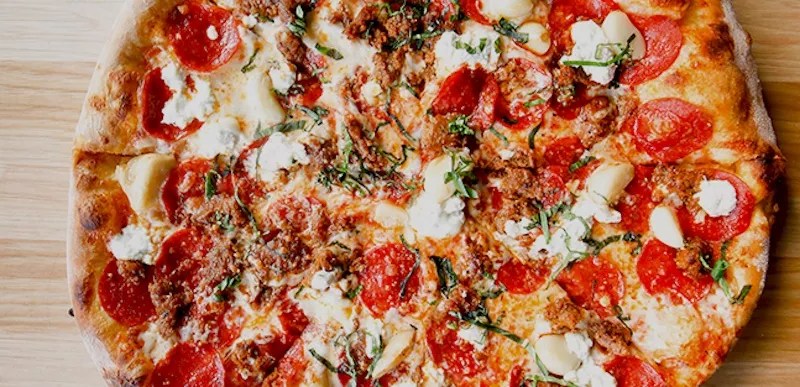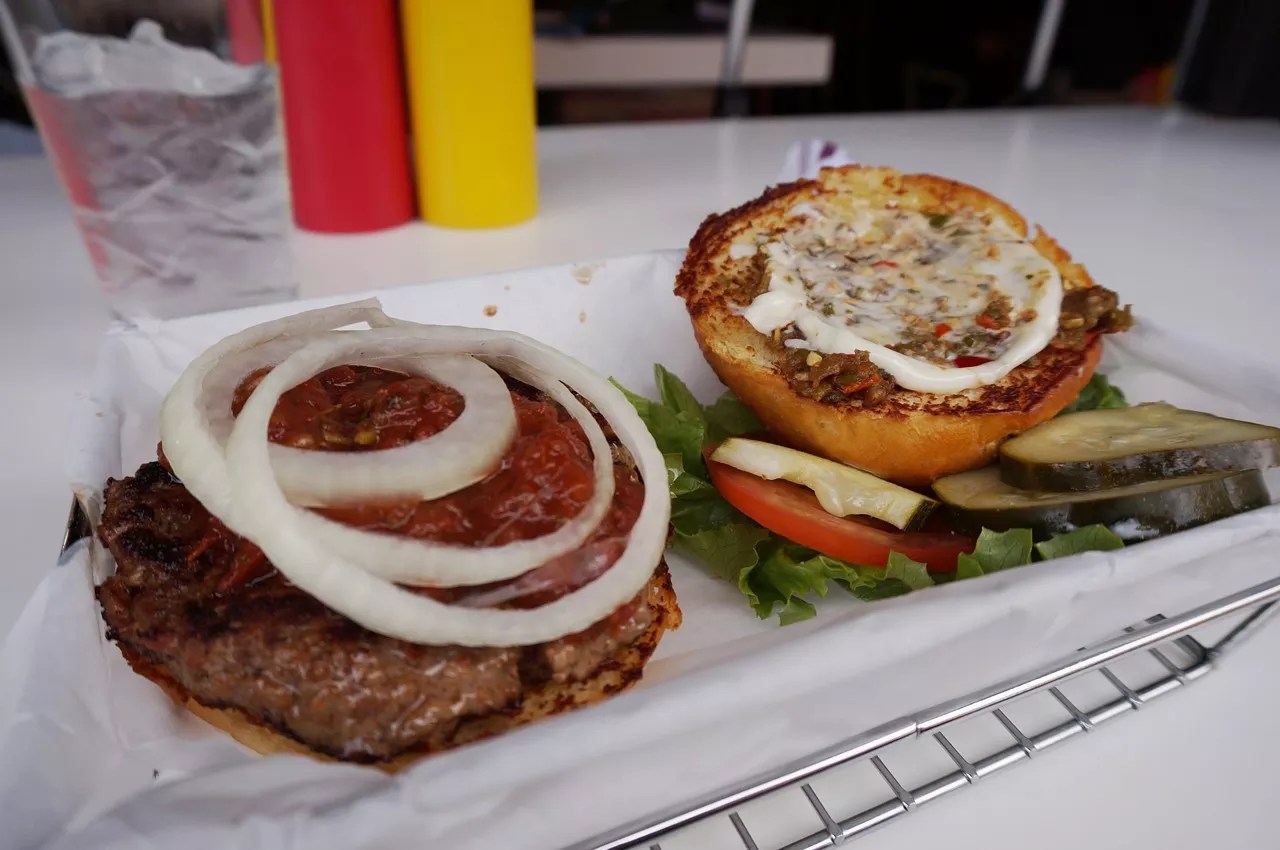
Laura Shunk

Audio By Carbonatix
Having one local chain of better burger joints just wasn’t enough for Jean-Philippe Failyau. Eight years after Failyau opened the first Park Burger in a tiny space near the University of Denver, he’s now advancing three different restaurant concepts. There are now four Park Burger locations in Denver, plus Park & Co. and siblings in the Middle East; Homegrown Tap & Dough‘s success in Wash Park inspired a second location in Arvada; and Failyau is in the process of building out not one, but two locations of Birdcall, the chicken sandwich restaurant that he and co-owner Peter Newlin cooked up. In advance of Birdcall’s opening in Five Points this month, we sat down with Failyau to talk about his expanding empire, Denver’s evolution and what we can expect at his new restaurant.
Jean-Philippe Failyau: I went to Colorado State University for school, where I met my wife, Jennifer. After graduation, I just didn’t see myself in an office, working 9 to 5. I’d always had a big passion for cooking: My grandma is from France and she’d worked in a fish shop in Brittany – so I had food in my blood. After college, Jennifer and I moved to NYC, where I went to the French Culinary Institute. It was a short program, just six months. I didn’t want to do a two-year program, because I wanted to be in the kitchen. I did an internship at Daniel and then worked for a year at JoJo, a Jean-Georges [Vongerichten] restaurant. Then I spent a year at Le Cirque. That was in 2000. Right after 9/11, we were kind of ready to come back home. We wanted to be close to family and comfort, and we were tired of living in a shoebox.
Back in Denver, I worked for Kevin Taylor for a year and then had the opportunity to work for Frank Bonanno at Mizuna. I was hired by Alex Seidel, and between then and when he went and opened Fruition, I thought we had one of the best teams in Denver. Frank gave us so much culinary freedom. We changed the menu monthly, and we were responsible for changes on our own stations, and for our dish on the tasting menu. We really pushed each other. It was really special. We were doing incredible things, and we were having fun doing it. We all shared ideas with each other. If there was something new we’d never made, Alex would print five recipes for it, and we’d make all five, and figure out the best one and adjust it until we got a dish we were excited about. I think a lot of chefs get their one recipe and say, “Here’s the dish.” But what is that dish? How is it balanced?
Alex taught me to send out every dish perfectly every time – that the burger at 6 p.m. on Friday needs to be the same as the burger coming out at closing time on Monday night. Consistency is hard. It’s easy to put up one great dish for a photo shoot or a tasting, but it’s harder to have the passion to do it every time a dish goes out. That’s why Alex has been so successful – he’s very consistent.
After Alex left, I moved up, and then Frank and I and Ryan Gaudin opened Osteria Marco on Larimer. It was a great opportunity to learn from Frank, to open something together. My dream was always to open a restaurant, and I always thought when I did it, I’d have a business plan that would say this is what’s going to happen, this is what we do. With Frank, there was no plan – it was, here’s the space, how can we offer value on the block? How can we offer great quality and service? We were doing an $8 margherita pizza and $5 house wine, in a neighborhood that was really a destination in Denver – we were across from the Capital Grille – and you didn’t have to break the bank to have a great experience. When we opened, in order to save some money, we printed all three owners’ names on one business card rather than printing three different cards. In restaurants, it’s all about the pennies! Restaurants had failed in that space a lot – it was big and in a basement, so people were scared of it, but we thought if we offered value and quality, we’d do well, and we did. I’ve used that kind of business plan with all of my ventures.

Homegrown Tap & Dough
I opened Park Burger on South Pearl in 2009. I was living a few blocks away. At the time, it was half the size it is now. It was a coffee shop, and no one was ever in there. In those days, the better burger was blowing up. Finally, the owner of the coffee shop approached me and asked, “Do you want to take over my lease?” I took what I learned from Osteria Marco: We were about better-quality ingredients; we had a better bun made for us by Grateful Bread, and our ingredients were never frozen. We made a burger with ham, cheese and an egg, and then our Royale, with bacon and caramelized onion and blue cheese. My son was a year old, and I wanted somewhere I could go on Sunday nights, somewhere that wouldn’t break the bank. The neighbors were excited – we were slammed from day one. The first night we were open, we had to close at 8 p.m. because we were just swamped. We ran out of beef. I remember going home and crying to my wife – you just felt like you worked so hard and put a great product out, but the challenge of opening restaurant was a lot.
From there, we were very fortunate to have opened other locations that have all been successful. Our next one was Park & Co., which was more bar-driven because of the Uptown crowd. Then we opened Park Burger in the Highlands. After that, Park Burger on Holly, and then RiNo. One of my early employees was Peter Newlin, who became my partner and president of the company. He was a server and going to DU, and he just caught the restaurant bug. We put a great team together, and that gave us the ability to expand at a pace that’s sustainable for us. We can give other employees opportunity for growth.
We also had an opportunity to open a franchise of Park Burger in Kuwait. A couple of students from Kuwait were out here at DU for grad school, and they loved what we were doing; they really wanted to bring that concept back home. We thought it would never happen, but thought, let’s get a trip out of this. Peter and I went out there, and then it kept moving forward and forward. It finally opened two years ago, and it’s still doing well. The people there have really embraced the American burgers, milkshakes and fries. It was a big challenge in the beginning to figure out how the menu would translate there; it’s a Muslim country, so there’s no pork – the bacon has to be turkey bacon. And alcohol is forbidden. But because of that restaurant, we just signed a franchise in Oman, as well, and we’re hoping to get that open in the next six to eight months. The hospitality [in those two countries] is just incredible. The moment you get there, people want to make you feel so welcome and taken care of.
A couple of years back, I’d go to Il Vicino in the Wash Park neighborhood, and just like with the coffee shop that became the original Park Burger, there was never anyone in there. It’s one of the coolest buildings in the neighborhood, but I suspect it’s because Il Vicino was fast-casual, and when I go into that space, I want to sit down; I don’t want to stand line to get another beer. The place came up for sale, and it still had the pizza oven, and I knew we could do something special there. That’s how we got Homegrown Tap & Dough. Just over a year ago, we had the opportunity to open another Homegrown in Arvada. A location came up in Olde Town, and the business in there before had struggled. It was a scary location for us, because it’s the biggest to date, but it’s a wonderful store and a wonderful community. Arvada and areas like it are tired of all the chains – they want something different. With Steuben’s, us, Denver Beer Co. -that area is turning into such a wonderful strip of restaurants, and the community has been so supportive.

Park Burger capitalized on the better burger.
Westword
And then the last concept that we’ve been working on is Birdcall. I always wanted to do a fried chicken concept – people relate to burgers, pizza, and we’re hoping to do the same with chicken. We’ve been working on the concept for a long time, but it never had materialized until our neighbor approached us about the Tom’s Home Cookin’ location. They’d just bought the building, and they needed a tenant. We wanted to try a fast-casual concept – we’re facing a rising cost of wages, and difficulty with hiring in this market. So we wanted to have something a little smaller, where you order at the counter. Peter put a ton of thought into the ordering system, which is custom-made for us from scratch. We’ve taken a similar approach to Park Burger – we have eight specialty chicken sandwiches, three specialty salads, four or five milkshakes and a breakfast menu we’re excited about. Five Points is such a wonderful neighborhood, and it’s changed a lot over the years. We like Rosenberg’s, and we’re excited about the crowd they brought to the neighborhood. We should be open by early July.
But we’re also planning a second location: We signed a lease on Evans in the old Twisters location. We thought, if we’re really going to believe in it and make a push for it, let’s look for another location. That one hopefully will open in about six months.
Now, with three or four concepts in our brand portfolio, we have the ability to see what the neighborhood needs. When we opened Arvada, we thought about doing a Park Burger. But it was a big space, and there was no pizza nearby. Park Burger will probably slow down on the growth, based on how competitive the burger market has gotten. There are a lot of great brands, good concepts and high quality.
With my fine-dining background, my dream was always to open a fine-dining restaurant. A tapas restaurant was at the top of my list. But I started thinking, how sustainable is fine dining? You can do pretty well Thursday, Friday, Saturday, but how busy are you the rest of the week? At Park Burger, I took what I learned in fine dining in terms of ingredients and technique and translated it to a more casual approach.
Now we’d like to get out of the state. Denver has gotten so expensive on rents and rates. Hiring is so tough. I think we’ve lost a lot of people to marijuana. Construction prices have skyrocketed. When we first opened, we’d announce open interviews, and in an hour, we’d have 75 people show up. Now you’re lucky when you get five people. Turnover is hard. People don’t even give two weeks’ notice anymore; they just stop showing up. But we do have a few employees who have been with us since day one. We’ve adjusted our starting wages: The cost of turnover, the cost of being short a line cook because they didn’t show up, the stress that adds, the weight it puts on the guest, the effect on the overall experience – we’d rather have a smaller bottom line right now and ride this out. We’re trying to keep cooks and staff longer than we have in the past. We’re trying to minimize turnover in both the front and back of the house.
But Denver’s great. It’s been a great city, and the growth is great for businesses. We’ve had a lot of big brands coming to town – Quality Italian, Departure – but people still embrace the local talent. Troy Guard, Alex Seidel, Frasca opening downtown: People are proud of what we’ve been able to accomplish. It’s such an exciting city.
Park Burger
Five metro locations (including Park & Co.)
parkburger.com
Homegrown Tap & Dough
Two metro locations
tapanddough.com
Birdcall
Two metro locations opening this summer
eatbirdcall.com